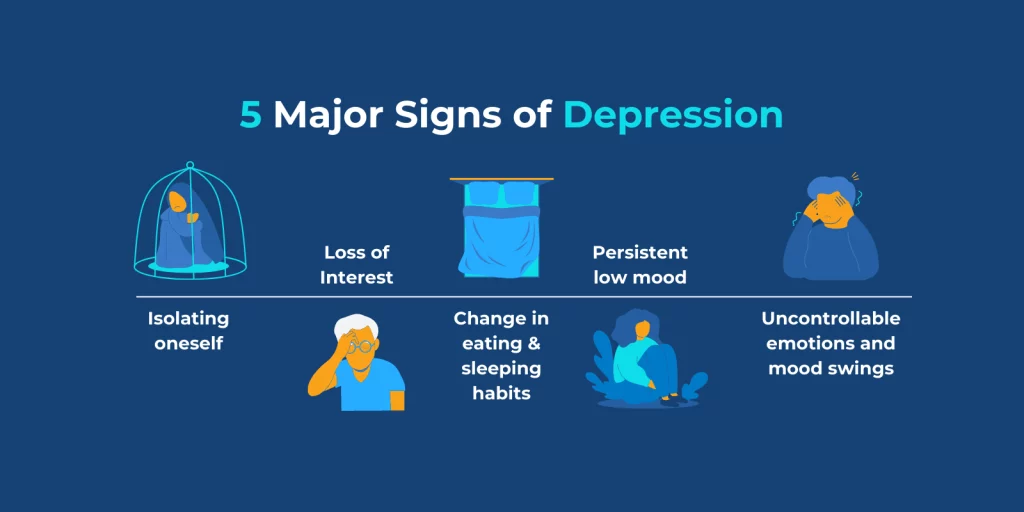Depression is a complex and pervasive mental health condition that affects millions of individuals worldwide. Acknowledging its signs and symptoms is crucial for early intervention and effective management. In this article, we will explore the subtle indicators of depression, emphasizing the importance of recognizing and addressing them promptly.
II. Common Signs of Depression
A. Persistent Sadness
- Individuals experiencing depression often grapple with persistent feelings of sadness that go beyond the usual ups and downs of life.
B. Loss of Interest
- A significant loss of interest in activities once enjoyed can be a telltale sign of depression, reflecting a decrease in overall motivation and pleasure.
C. Changes in Sleep Patterns
- Insomnia or excessive sleeping can be indicative of underlying emotional distress associated with depression.
D. Fatigue and Lack of Energy
- Feelings of extreme fatigue and a lack of energy are common symptoms, affecting both physical and mental well-being.
E. Feelings of Guilt or Worthlessness
- Depressed individuals may experience unwarranted guilt or feelings of worthlessness, even in the absence of clear reasons.
III. Physical Symptoms
A. Headaches and Body Aches
- Physical discomfort, such as frequent headaches or unexplained body aches, can be linked to the emotional toll of depression.
B. Appetite and Weight Changes
- Significant changes in appetite, leading to weight loss or gain, are common manifestations of depressive disorders.
IV. Cognitive Signs
A. Difficulty Concentrating
- Depression can impair cognitive function, making it challenging for individuals to concentrate or focus on tasks.
B. Indecisiveness
- Increased indecisiveness is another cognitive symptom, hindering the ability to make even minor decisions.
V. Emotional Indicators
A. Irritability
- Unexplained irritability and a heightened sensitivity to stimuli can be expressions of underlying depressive emotions.
B. Increased Sensitivity
- Individuals with depression may become more emotionally sensitive, reacting strongly to situations that wouldn’t usually trigger such responses.
C. Crying Spells
- Frequent and unexplained crying spells may be indicative of the emotional turmoil associated with depression.
VI. Social Withdrawal
A. Isolation
- Depressed individuals often withdraw from social activities, isolating themselves as a means of coping with their emotional struggles.
B. Avoidance of Activities
- A decrease in participation in once-enjoyed activities can be a sign of social withdrawal and emotional distress.
VII. Impact on Daily Life
A. Work Performance
- Depression can significantly impact work performance, leading to a decline in productivity and increased absenteeism.
B. Relationships
- Personal relationships may suffer as individuals with depression find it challenging to connect emotionally with others.
VIII. Seeking Help
A. Importance of Professional Assistance
- Recognizing the signs early is crucial, and seeking professional help can be instrumental in managing and overcoming depression.
B. Support Systems
- Building a strong support system is essential for individuals dealing with depression, emphasizing the importance of open communication.
IX. Coping Strategies
A. Healthy Lifestyle Choices
- Adopting healthy lifestyle choices, including regular exercise and a balanced diet, can contribute to overall well-being and aid in managing depression.
B. Therapeutic Approaches
- Various therapeutic approaches, such as counseling and medication, can be effective tools in addressing and alleviating the symptoms of depression.
X. Conclusion
In conclusion, understanding and recognizing the signs of depression are pivotal for early intervention and effective management. By acknowledging the emotional landscape associated with depression, individuals can take proactive steps toward seeking help and implementing coping strategies for a healthier and more fulfilling life.
FAQs – Understanding Depression
- How can I differentiate between normal sadness and depression?
- While sadness is a natural emotion, persistent feelings of hopelessness, loss of interest, and physical symptoms may indicate depression. Consult with a healthcare professional for a thorough assessment.
- Is it common for physical symptoms to accompany depression?
- Yes, physical symptoms such as headaches, fatigue, and changes in appetite are common in individuals experiencing depression. These symptoms are often interconnected with the emotional aspects of the condition.
- Can depression be managed without medication?
- In some cases, yes. Lifestyle changes, therapy, and support systems can play a crucial role in managing depression. However, medication may be recommended based on the severity of symptoms.
- How do I approach someone I suspect is experiencing depression?
- Express concern and offer support. Encourage them to seek professional help and be understanding of their feelings. Avoid judgment and be patient in navigating the conversation.
- Are there specific risk factors for developing depression?
- While anyone can experience depression, certain factors such as a family history of mental health issues, trauma, or chronic stress may increase the risk. It’s essential to be aware of these factors for early intervention.

